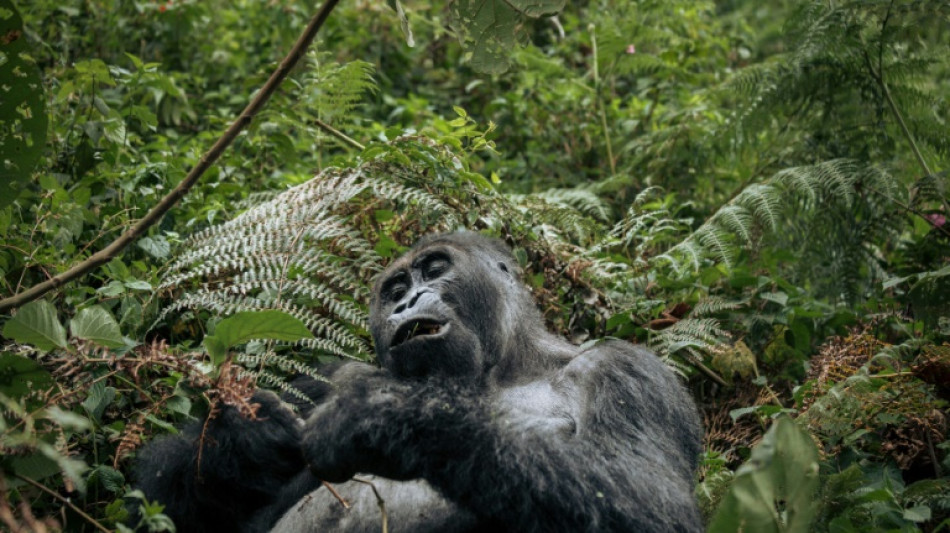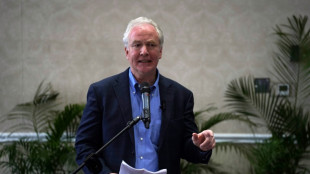
-
 SFWJ / Medcana Announces Strategic Expansion Into Australia With Acquisition of Cannabis Import and Distribution Licenses
SFWJ / Medcana Announces Strategic Expansion Into Australia With Acquisition of Cannabis Import and Distribution Licenses
-
Arsenal's Havertz could return for Champions League final

-
 US officials split on Ukraine truce prospects
US officials split on Ukraine truce prospects
-
Client brain-dead after Paris cryotherapy session goes wrong

-
 Flick demands answers from La Liga for 'joke' schedule
Flick demands answers from La Liga for 'joke' schedule
-
'Maddest game' sums up Man Utd career for Maguire

-
 Trial opens for students, journalists over Istanbul protests
Trial opens for students, journalists over Istanbul protests
-
Gaza rescuers say Israeli strikes kill 24 after Hamas rejects truce proposal

-
 'Really stuck': Ukraine's EU accession drive stumbles
'Really stuck': Ukraine's EU accession drive stumbles
-
'Not the time to discuss future', says Alonso amid Real Madrid links

-
 74 killed in deadliest US attack on Yemen, Huthis say
74 killed in deadliest US attack on Yemen, Huthis say
-
Southgate's ex-assistant Holland fired by Japan's Yokohama

-
 Vance meets Meloni in Rome before Easter at the Vatican
Vance meets Meloni in Rome before Easter at the Vatican
-
Ryan Gosling to star in new 'Star Wars' film

-
 Hamas calls for pressure to end Israel's aid block on Gaza
Hamas calls for pressure to end Israel's aid block on Gaza
-
Russia says Ukraine energy truce over, US mulls peace talks exit

-
 58 killed in deadliest US strike on Yemen, Huthis say
58 killed in deadliest US strike on Yemen, Huthis say
-
Museums rethink how the Holocaust should be shown

-
 Three dead after deadly spring storm wreaks havoc in the Alps
Three dead after deadly spring storm wreaks havoc in the Alps
-
No need for big changes at Liverpool, says Slot

-
 Bloody Philippine passion play sees final performance of veteran 'Jesus'
Bloody Philippine passion play sees final performance of veteran 'Jesus'
-
New US envoy prays, delivers Trump 'peace' message at Western Wall

-
 Postecoglou sticking around 'a little longer' as Spurs show fight in Frankfurt
Postecoglou sticking around 'a little longer' as Spurs show fight in Frankfurt
-
US threatens to withdraw from Ukraine talks if no progress

-
 Tears and defiance in Sumy as Russia batters Ukraine border city
Tears and defiance in Sumy as Russia batters Ukraine border city
-
Russia rains missiles on Ukraine as US mulls ending truce efforts

-
 Tokyo leads gains in most Asian markets on trade deal hopes
Tokyo leads gains in most Asian markets on trade deal hopes
-
Two missing after deadly spring snowstorm wreaks havoc in the Alps

-
 'War has taken everything': AFP reporter returns home to Khartoum
'War has taken everything': AFP reporter returns home to Khartoum
-
US strikes on Yemen fuel port kill 38, Huthis say

-
 Slegers targets Lyon scalp in pursuit of Arsenal European glory
Slegers targets Lyon scalp in pursuit of Arsenal European glory
-
'Defend ourselves': Refugee girls in Kenya find strength in taekwondo

-
 China's manufacturing backbone feels Trump trade war pinch
China's manufacturing backbone feels Trump trade war pinch
-
Sri Lankans throng to Kandy for rare display of Buddhist relic

-
 Chinese vent anger at Trump's trade war with memes, mockery
Chinese vent anger at Trump's trade war with memes, mockery
-
Heartbroken Brits abandon pets as living costs bite

-
 Mongolian LGBTQ youth fight for recognition through music, comedy
Mongolian LGBTQ youth fight for recognition through music, comedy
-
Cash crunch leaves Syrians queueing for hours to collect salaries

-
 Lyon left to regroup for Champions League bid after painful European exit
Lyon left to regroup for Champions League bid after painful European exit
-
Unravelling Real Madrid face Athletic Bilbao Liga test

-
 Napoli disturbing buoyant Inter's peace in Serie A Easter bonanza
Napoli disturbing buoyant Inter's peace in Serie A Easter bonanza
-
Disappointed Dortmund chase consistency with Europe at stake

-
 Asian markets mixed as traders track tariff talks
Asian markets mixed as traders track tariff talks
-
Yan and Buhai share lead at LA Championship

-
 Under fire at debate, Canada PM Carney tries to focus on Trump
Under fire at debate, Canada PM Carney tries to focus on Trump
-
Liverpool poised for Premier League coronation, Leicester, Ipswich for relegation

-
 India's elephant warning system tackles deadly conflict
India's elephant warning system tackles deadly conflict
-
US senator meets wrongfully deported Salvadoran migrant

-
 Gustavo Dudamel: the superstar conductor building bridges to pop
Gustavo Dudamel: the superstar conductor building bridges to pop
-
Japan rice prices soar as core inflation accelerates


Wildlife populations plunge 69% since 1970: WWF
Wild populations of monitored animal species have plummeted nearly 70 percent in the last 50 years, according to a landmark assessment released Thursday that highlights "devastating" losses to nature due to human activity.
Featuring data from 32,000 populations of more than 5,000 species of mammals, birds, amphibians, reptiles and fish, the WWF Living Planet Index shows accelerating falls across the globe.
In biodiversity-rich regions such as Latin America and the Caribbean, the figure for animal population loss is as high as 94 percent.
Globally, the report found that monitored animal populations had fallen 69 percent since 1970.
Marco Lambertini, director general of WWF International, said his organisation was "extremely worried" by the new data.
"(It shows) a devastating fall in wildlife populations, in particular in tropical regions that are home to some of the most biodiverse landscapes in the world," he said.
Mark Wright, director of science at WWF, said the figures were "truly frightening", particularly for Latin America.
"Latin America is renowned for his biodiversity of course, it's really important for lots of other things as well," he said.
"It's super important for regulating the climate. We estimate currently there's something like 150 to 200 billion tonnes of carbon wrapped up in the forests of the Amazon."
That is equivalent to 550 to 740 billion tonnes of CO2, or 10 to 15 times more than annual greenhouse gas emissions at current rates.
The index found that freshwater species had declined more than those found in any other habitat, with an 83-percent population fall since 1970.
The report found that the main drivers of wildlife loss are habitat degradation due to development and farming, exploitation, the introduction of invasive species, pollution, climate change and disease.
Lambertini said the world needed to rethink its harmful and wasteful agricultural practices before the global food chain collapsed.
"Food systems today are responsible for over 80 percent of deforestation on land, and if you look at the ocean and freshwater they are also driving a collapse of fishery stocks and populations in those habitats," he said.
With world leaders due to convene in Montreal for the COP15 biodiversity summit in December, the report authors called for an international, binding commitment to protect nature, similar to the 2015 Paris Agreement on climate change.
- 'Need to act now' -
The Living Planet Report argues that increasing conservation and restoration efforts, producing and consuming food more sustainably, and rapidly and deeply decarbonising all sectors can alleviate the twin crises of climate change and biodiversity loss.
It also calls for governments to properly factor into policymaking the value of services rendered by nature, such as food, medicine and water supply.
"We need to stress the fact that nature loss is not just a moral issue of our duty to protect the rest of the world. It is actually an issue of material value, an issue of security for humanity as well," said Lambertini.
Some areas experienced more population loss than others -- Europe, for example, saw a wildlife population decline of 18 percent.
"But that also masks historic, very extreme losses of biodiversity," said Andrew Terry, director of conservation at the Zoological Society of London, which helped compile the data.
"We know that we're coming out of (a) low point in the state of biodiversity in the northern hemisphere."
In Africa, where 70 percent of livelihoods rely on nature in some form, the report showed a two-thirds fall in wildlife populations since 1970.
Alice Ruhweza, Africa regional director at WWF, said the assessment showed how there was a "huge human cost" when nature is lost.
She said young people in particular were concerned about wildlife preservation, and would push governments to implement greater protective measures.
"We have a young, entrepreneurial and increasingly educated population that is showing more awareness around issues of nature," said Ruhweza.
"So the potential for transformative change is really significant. But the time is running short, and we need to act now."
F.Pedersen--AMWN



